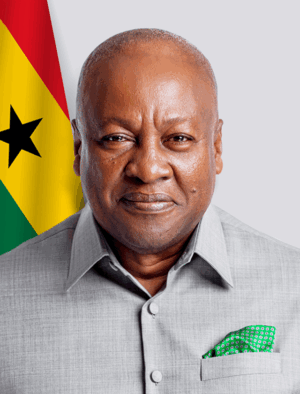By Ephraim Ofori NUMOSUOR
As the clock hits the 100-day milestone since President John Dramani Mahama resumed his role at the helm of Ghana, the country takes a moment to evaluate the atmosphere, pace, and direction of his renewed leadership.
Following his historic re-election in the 2024 elections, the bar has been set incredibly high—and rightfully so. Bringing back an ex-president during a time marked by profound economic and systemic dissatisfaction isn’t merely about changing the face of leadership; it’s a call for fundamental reform.
In President Mahama’s initial 100 days, he has spearheaded significant changes, faced debates over key nominations, and made several rapid executive choices that indicate the path his second term will follow.
Some praise his vigor and clear objectives, whereas others warn that his ambition may be outpacing responsibility.
A more streamlined cabinet, a stronger message
One of Mahama’s earliest and most celebrated actions was downsizing the number of ministries from more than 30 to only 23. Given that oversized administrations have historically burdened public funds within this political landscape, this move conveyed a strong signal: this administration is serious about governance.
The rapid selection and assessment of 56 ministers and deputy ministers—a blend of new talents, faithful veterans, and experts—ensured that governmental operations commenced promptly. This move signaled not only capability but also a deliberate sense of immediacy.
An increase in appointments: based on merit and loyalty
Past the cabinet level, the president swiftly proceeded to appoint leaders for various state institutions and agencies. Executives at government-run companies along with board members and specialized advisers underwent changes—either being reassigned or removed entirely. This move has been interpreted by some as an effort to clean house, whereas others perceive it as strategic realignment within the administration’s power dynamics.
Critics contend that although these appointments might demonstrate political allegiance, they could also promote a winner-take-all mentality. Conversely, supporters assert that the president is merely building a cohort of individuals he can rely on to swiftly and accurately implement his agenda.
A fresh economic framework: tax breaks for individuals
One of the most concrete achievements during the president’s initial period was the elimination of various taxes that weighed down both enterprises and average citizens. The 2025 budget detailed the scrapping of these taxes, which included:
- The 15 percent Value Added Tax applicable to electricity usage by household consumers,
- The Emissions Levy,
- The Betting Tax,
- The COVID-19 Health Restoration Tax
The majority of people and businesses have applauded these reductions in taxes, viewing them as an initial move towards reviving consumers’ trust and increasing their spending money.
The decision to decrease the tax refund from 6 percent to 4 percent in order to compensate for the revenue shortfall resulting from the elimination of those taxes has been praised by financial analysts as a prudent strategy.
Is a new constitution looming ahead?
President Mahama made an audacious and surprising announcement regarding the establishment of a Constitutional Review Implementation Committee, which addresses longstanding demands for amendments to the constitution.
The committee has been assigned the responsibility of putting into action the suggestions made by the 2011 Constitutional Review Commission. This includes modifications to the authority held by the executive branch, adjustments to the function of local governments, as well as improvements to oversight mechanisms. Through revitalizing discussions around constitutional amendments, Mahama is strongly advocating for more extensive democratization efforts.
Education and youth development
Education has been a key focus area early on in Mahama’s agenda. He has taken steps to rejuvenate dormant E-block and TVET initiatives, instructed an assessment of the Free SHS program, and ensured stable financing for it.
The president has similarly suggested implementing a nationwide initiative for young people aimed at fostering job growth and entrepreneurial ventures. Given that youth unemployment remains a critical concern, his capacity to transform policies into tangible outcomes will be crucial in validating these initial commitments.
Environmental governance meets resistance
President Mahama’s order to stop mining activities in forest reserves and water bodies, along with his initiative to create the Ghana Gold Board to oversee small-scale gold mining, underscores his dedication to combating illicit mining operations.
Nonetheless, the Obuasi mine shooting incident, which involved both soldiers and artisanal miners, cast a dark cloud over these initiatives, serving as a stark reminder that law enforcement should be tempered with dialogue.
Economic revival versus societal endurance
When they took office, the administration faced an unstable economy plagued by inflation, heavy debt, and persistently high unemployment. Their chosen path involves “shock therapy,” which entails reducing unnecessary expenditures while fostering growth through strategic investments—a method fraught with risk but potentially offering substantial rewards. Additionally, their intention to revisit parts of the agreement with the IMF demonstrates a desire to maintain financial prudence alongside addressing national needs.
A presidency in motion
President Mahama’s initial 100 days in office have been marked by intensity, strategic planning, and occasional controversy. He has swiftly implemented policy directions, taken decisive actions, and initiated reforms within institutions.
However, as the dust of transition starts to settle, the genuine task commences: bringing about palpable improvements in the everyday lives of typical Ghanaians. The coming 100 days will reveal whether these decisive actions lay the groundwork for a lasting legacy or simply fade away like remnants of political spectacle.
>>The author is a financial economist with experience as a research and policy analyst, recognized for his insights into political economics, institutional reforms, and public policies in Ghana and throughout Africa. You can contact him through
[email protected]
and or 0248803710
Provided by Syndigate Media Inc. (
Syndigate.info
).


Leave a Reply